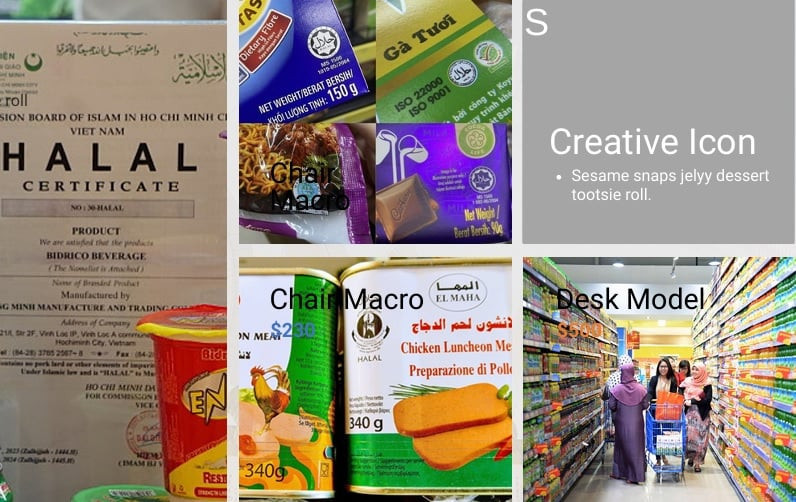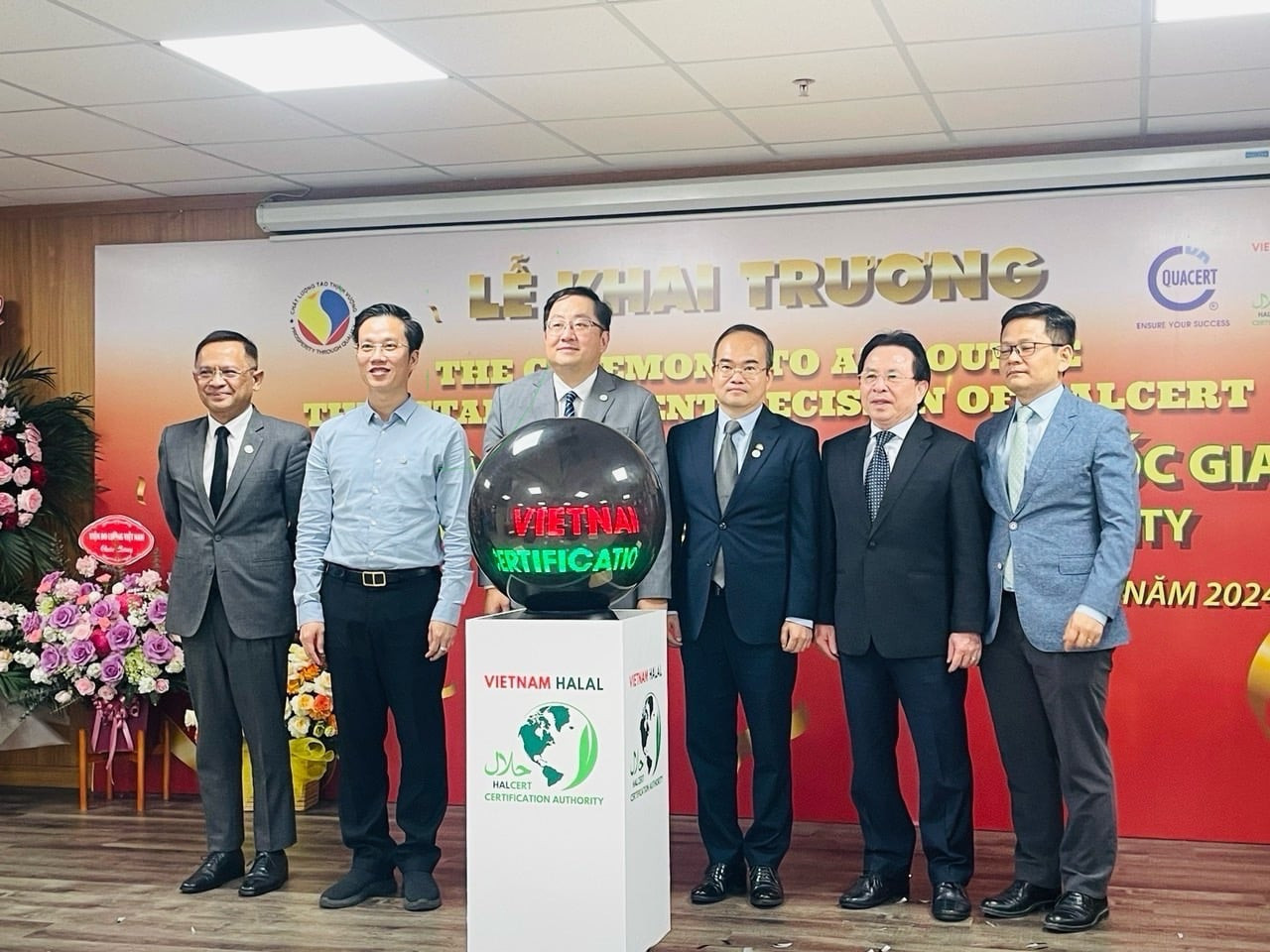
Photo: Middle East - Africa Department.
The “passport” to the Halal market
Nguyen Trung Hai, a former lecturer at Ho Chi Minh City University of Agriculture and Forestry, shares his interest in accessing this lucrative market: “I grow mint, which I currently export to Japan. Some of my mint oil is resold in the Middle East at over 100 million VND per liter, while I only sell it for 1 million VND. I’d like to learn how to export directly to Muslim countries to boost revenue,” he said at a recent workshop on successful Halal business strategies.
Nguyen Thi Quy Linh, CEO of F&G Vietnam, has successfully exported to the Muslim market for years and shared her experience. She emphasized that Halal certification is a must. Since 2018-2019, F&G Vietnam has held Halal certification, enabling it to reach Muslim markets.
“In the beginning, Halal was unfamiliar territory. Although we had other certifications like CE and ISO, they weren’t interchangeable with Halal, which has unique criteria. We had to consult with Halal experts to expedite the certification process,” Linh said.
Vietnam now has several recognized Halal certifying bodies, including the Halal Certification Agency (HCA), Halal Vietnam (HVN), and the National Halal Certification Center (HALCERT). The certification process typically costs $3,000–$5,000, with renewal fees decreasing over time; F&G Vietnam’s fifth-year renewal fee dropped to about 22 million VND.
“Halal certification is affordable compared to some other certifications, like the European certification for food, which can cost $5,000–$7,000 and requires significant factory investment,” Linh noted.
She cautioned that, as the number of Vietnamese businesses entering the Muslim market remains small, Halal certifiers have been lenient on some criteria. However, formalizing the process will soon be necessary, and businesses should follow the Halal standards established by the Ministry of Science and Technology.
Muslim markets have shown strong stability; F&G Vietnam has consistently supplied these countries since 2018 with sustained demand. "Muslim consumers, representing a third of the global population, are willing to pay more for clean, green products with Halal certification.
Given the growing accessibility through free trade agreements, Vietnamese businesses should capitalize on this opportunity," Linh urged, dismissing concerns that Halal certification is excessively challenging.
Nguyen Thi Thai Binh, Deputy Director of the Africa and Middle East Department at the Ministry of Foreign Affairs, outlined four major global Halal standards: GSO 993:2015, OIC/SMIIC 1:2019, HAS 23103:2012, and MS 1500:2019, each highly regarded and widely adopted.
For certification, Halal inspectors review applications, conduct on-site inspections, and issue certification if products meet all requirements. Certified products then carry the Halal logo, increasing their appeal to Muslim consumers. Certification also requires periodic monitoring, and non-compliance can lead to revocation.
Building a Halal ecosystem to tap into a $10 trillion market

Deputy Director Binh underscored the immense potential of the Muslim market. With a current global economic value of over $7 trillion in 2024, it’s projected to reach $10 trillion by 2028. With over 2.2 billion Muslims globally, expected to grow to 2.8 billion by 2030, the Halal market is expanding twice as fast as other sectors.
According to the 2023 Dinar Standard report, key Halal sectors include cosmetics, pharmaceuticals, Muslim-friendly tourism, media, entertainment, fashion, food, and finance. Interestingly, major Halal beef, lamb, and poultry exporters are not Muslim-majority countries but rather Brazil, Australia, and New Zealand. Similarly, popular Halal tourism destinations include Singapore, Thailand, Taiwan, Japan, and South Korea.
Dr. Nguyen Van Minh, Director of the Institute for Training and Enterprise Consultancy at the University of Foreign Trade, offered encouraging news for Vietnamese businesses. “Entering the Halal market means reaching a third of the global population and nearly half of the world’s purchasing power. Many Muslim markets are more accessible than imagined; for instance, products approved in Indonesia are readily accepted in Turkey,” he explained.
Dr. Le Phuoc Minh, former Director of the Institute for African and Middle Eastern Studies, pointed out opportunities for Vietnamese participation in Halal supply chains. With 62% of the global Muslim population residing in Asia, Vietnam is well-positioned to meet Halal standards with its agricultural products, including rice, coffee, tea, seafood, spices, beans, and fresh produce. Vietnam’s advanced free trade agreements with high-standard markets like the EU, US, and Japan further support entry into the Halal sector.
Growing demand for Halal-certified products is not limited to Muslim-majority nations; even in China, Russia, France, and the U.K., Halal products are popular among non-Muslim consumers. “Missing out on the Halal market would be a huge missed opportunity for Vietnamese businesses,” Dr. Minh observed.
Challenges remain, however, as Dr. Minh noted. Awareness of Halal standards is low among Vietnamese enterprises, and certification processes in Vietnam remain complex and unaligned with international standards.
The high costs of specialized equipment and raw materials meeting Halal standards, coupled with a limited Muslim workforce (around 100,000 people mainly in the southern provinces), hinder access to Halal markets, especially for northern and central Vietnamese companies.
To position Vietnam among the top 15–20 Halal exporters globally by 2030, Dr. Minh proposed several measures: effectively implementing the national initiative “Promoting International Cooperation for Halal Industry Development in Vietnam by 2030,” focusing on economic diplomacy with Muslim countries, establishing a Halal ecosystem in Vietnam that attracts both foreign and domestic investment, and leveraging digital transformation and e-commerce to boost exports.
“Currently, our approach to the Halal market is fragmented and small-scale. It’s crucial for the government and relevant ministries to build a robust foundation for a structured and sustained entry into this market,” Dr. Minh advised.
Binh Minh